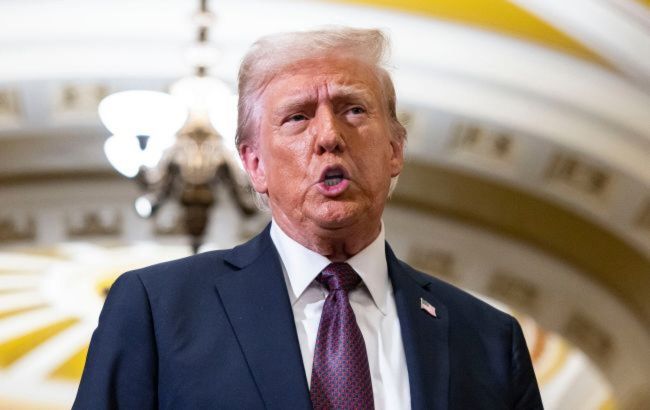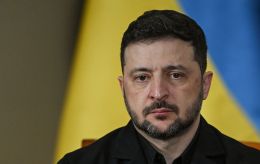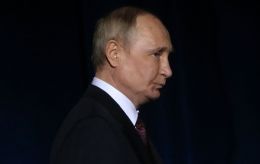Peace deal delayed, White House prepares new pressure tactics on Russia - Reuters
 Photo: Donald Trump, President of the United States (Getty Images)
Photo: Donald Trump, President of the United States (Getty Images)
The Trump administration does not rule out the possibility that the US will not be able to reach a peace agreement on Ukraine in the next few months. The White House is developing new mechanisms of pressure on both Kyiv and Moscow, according to Reuters.
Two sources familiar with the matter told the agency that neither of the two agreements appears imminent. This increases the likelihood of the war dragging on and more support from the West for Ukraine's military operations.
"Such an outcome would be anathema to Trump, a self-styled dealmaker who has repeatedly promised a quick end to a conflict that has claimed hundreds of thousands of lives and risks pulling NATO into a direct conflict with nuclear-armed Russia," Reuters writes.
For several weeks, senior US officials have privately complained about how Kyiv is conducting negotiations and what they perceive as resistance to the Washington agreement on mining resources and advancing peace talks.
However, sources say that in recent days, officials have become increasingly disappointed with Moscow.
Sanctions pressure and distant agreement
During several meetings and calls over the weekend, White House and State Department officials acknowledged that Russian dictator Vladimir Putin is actively resisting Washington's attempts to broker a long-term peace agreement. They discussed economic or diplomatic sanctions that could push Russia to agree to a deal, if any exist.
According to sources, the growing anger towards the Kremlin, particularly from Trump, signals a shift in the internal discussions within the administration regarding Moscow's readiness for negotiations.
For weeks, Trump has stated that he trusts the Russian president and believes in his commitment to peace, but in recent days, the White House has begun to view Putin's intentions with suspicion, although Trump continues to publicly show his belief in the Russian leader's desire to end the war.
It is unclear what specific plans the administration might have to pressure Moscow, but one senior US official noted that the White House continues to consider additional tariffs and sanctions against Russia.
According to the agency, during a meeting with the Baltic foreign ministers last week, US Secretary of State Marco Rubio said that peace in Ukraine is not guaranteed. He also added that the US is still far from reaching an agreement.
"There is a deep frustration with the Russian government over negotiations," National Security Council spokesperson James Hewitt said. "President Trump was clear he will consider imposing secondary sanctions on all oil coming out of Russia if they are not serious about bringing this conflict to a peaceful resolution."
Putin’s 'maximalist' demands
European and American intelligence and analysts have long warned that Putin is unlikely to negotiate an end to the war in Ukraine voluntarily as long as he believes that Russia is winning on the battlefield.
After Trump took office in January, his senior advisors remained hopeful that three years of sanctions against Russia - and the prospect of either easing or intensifying economic pressure - would be enough to bring Moscow closer to a deal.
Now, some of them, including Rubio, National Security Advisor Mike Waltz, and the administration’s envoy to Ukraine, Keith Kellogg, are raising questions about how much pressure can be applied to Putin without significant concessions from the US and Europe, especially regarding their military operations on the continent.
In recent months, Washington has pressured Kyiv and moved closer to many of Moscow’s foreign policy positions. However, Putin has made what analysts call "maximalist" demands that are unlikely to be met by the US, Ukraine, or Europe.
Among them are demands for the US and NATO to reduce military activity in Europe, especially in countries bordering Russia, and for peacekeeping forces to not be deployed in Ukraine.
However, Reuters writes, a senior US official said that while the White House continues to consider tariffs and sanctions, such economic penalties are unlikely to change the Kremlin's position.
US peace proposals
After being elected president, Donald Trump and his key advisors set a goal of achieving a complete ceasefire by April or May 2025. They hoped to finalize a long-term peace agreement within a few months.
The US side proposed a 30-day ceasefire across the entire front line. President Volodymyr Zelensky agreed to the proposal, but Putin began to present his conditions, which were unrealistic to fulfill and which Kyiv refused to accept.
Meanwhile, Russian forces intensified drone strikes on Ukrainian cities and failed to adhere to the agreement regarding halting strikes on energy infrastructure and facilities in the Black Sea region.
Russian Deputy Foreign Minister Sergey Ryabkov stated that Moscow could not accept the US proposals for ending the war in their current form, as they did not address the issues that, according to the Kremlin, led to the war.
Recently, Putin criticized trust in Ukrainian President Volodymyr Zelensky. In response, Trump "got pissed off" and suggested that the US could impose additional tariffs of 25-50% on Russian oil buyers.
Trump also expressed new frustration with Ukraine, accusing Zelenskyy of attempting to back out of an agreement on the minerals deal.
National Security Council spokesperson James Hewitt stated that Trump views the resource extraction agreement as "a key part of achieving peace in Ukraine."

